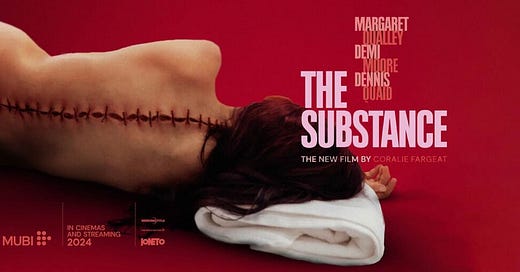Your Avatar Can Kill You
And other lessons from Coralie Fargeat's body horror film 'The Substance' with Demi Moore
I am not a watcher of horror. I’m barely a watcher of psychological thrillers. I watch so few horror films (the last was probably Jordan Peele’s Get Out from 2018), that I didn’t know ‘body horror’ was its own sub-genre. But there I was on Thanksgiving night, after a dinner of frozen pizza (for me) and rice (for my husband who had a stomach virus) watching The Substance—both hands covering my face for more than half of the film’s 2 hours and 20 minutes as I stated, out loud and more than once, “okay, okay, now that’s just gratuitous.”
The Substance is about an aging starlet, played by Demi Moore, who is fired from her aerobics show (a vestige of a once glorious career) on her 50th birthday. Desperate for relevance, she signs up for the titular substance, which separates her into two people: her 50-year-old self and a 20-year-old younger version (played by Margaret Qualley). The only stipulation is that only one self can be active at a time and they must switch every seven days.
It does not take long for a war to wage between the selves. Time borrowed by the younger, idealized self against the older, real self has a high price, which I will not describe so as not to ruin the movie for you.
The Substance is about aging and beauty standards, but it is also—and perhaps more importantly—about living with a divided self. It is about reconciling or failing to reconcile the gap between the flawless self we present and the authentic self we hide. As someone who has “bottomed out” and landed in a 12-step program as the result of such an irreconcilable gap, I am familiar with this dilemma. However, a person does not need an unmanageable life for them to experience such division. Most users of social media, particularly image and video-driven platforms like Instagram and Tiktok—which demand 24/7 access to manicured lives dreamed up by idealized selves—are familiar with such a split.
“Ancient women had pools of water into which they could peer, but our ancestors didn’t have scads of selfies lurking in their pockets. They weren’t tagged in unflattering photos snapped by friends. They didn’t have to look at their own faces on Zoom all day. Our brains haven’t evolved to bear the burden of that kind of self-consciousness,” writes Alissa Wilkinson in The New York Times review of Fargeat's film, which came out Sept 20—
{{{{{ ——- record scratch ———}}}}
Wait, this film with Demi Moore (who P.S. is actually 62 years old) came out in mid-September? And it was reviewed in the NYT? Why did a culture-savvy person like me only hear about it a week ago at a dinner party where everyone was younger than me? I decided to Google-search the term “The Substance sleeper hit” and, thanks to a chat forum with bad graphics called Lipstick Alley, I got answers. It turns out that Fargeat's film was set up with Universal Pictures, with the studio’s longtime production partner, Working Titles, handling the filming. However, after executives at Universal saw the film, they decided it was too weird and dumped it. The Substance was picked up by MUBI, a new and unproven streaming service and film distributor, which is a longwinded way of saying that the film isn’t on Netflix.
To date The Substance, which cost $17.5M to make, has made over $55M at the box office. That is significantly more than recent horror movies Universal did not dump—Renfield, Last Voyage of the Demeter, Abigail—have made. And now that Oscar buzz surrounds Fargeat's film, let the message ring loud and clear to executives everywhere…
Never underestimate an audience’s capacity for weird done well.






“Weird done well,” that may describe most, mostly functional lives. As usual from Mieke, a provocative “stir of the soup.” More to come in the next day or so. This one I need to think about!❤️
Z
“Reconciling, or failing to reconcile a (our) divided self” constitutes for most of us, I think, our mission in this life.
Movies entertain because the fantasy, the story touches something real in us. Movie reviews, at least this one, help us identify where that “real” resides in our body and mind.
Reconciliation takes many forms, as attendance at a twelve-step meeting will disclose.
I am grateful that you chose this movie to review. Your decision to call out this reconciliation condition shows your savvy and your deep compassion, Mieke.
Thank you!
Greg